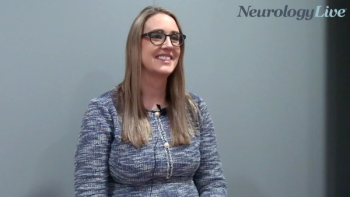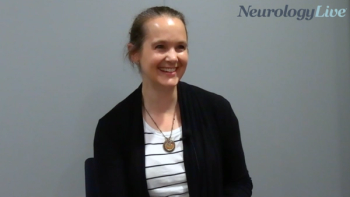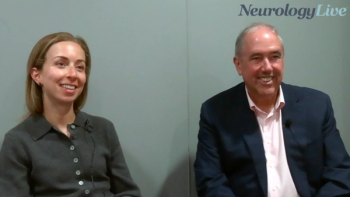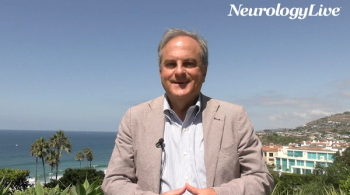
At ECTRIMS 2025, a staff neurologist at Cleveland Clinic discussed findings from an observational study on long-term safety risks of ocrelizumab in patients with multiple sclerosis. [WATCH TIME: 3 minutes]

At ECTRIMS 2025, a staff neurologist at Cleveland Clinic discussed findings from an observational study on long-term safety risks of ocrelizumab in patients with multiple sclerosis. [WATCH TIME: 3 minutes]

Mind Moments®, a podcast from NeurologyLive®, brings you an exclusive interview with Daniel Ontaneda, MD, PhD. [LISTEN TIME: 19 minutes]

In episode 1, Bove explores how ofatumumab, a B-cell–depleting therapy, stands apart from fingolimod and fumarates, and why its mechanism may offer distinct treatment advantages.

At AHS 2025, Eric Baron, DO, headache specialist at Cleveland Clinic, presented findings from a cross-sectional survey that examined psychedelic use among Canadian patients with migraine and cluster headache.

At ECTRIMS 2025, the postdoctoral research fellow at the University of Siena in Italy talked about how machine learning could classify multiple sclerosis into biologically distinct subtypes. [WATCH TIME: 5 minutes]

In a phase 3 trial presented at ECTRIMS 2025, ocrelizumab demonstrated noninferior relapse control compared with fingolimod in pediatric patients with relapsing-remitting multiple sclerosis.

Primary results presented at ECTRIMS 2025 suggest that body-weight–adjusted high-dose of ocrelizumab did not further slow disease progression in patients with primary progressive multiple sclerosis.

The vice president of scientific engagement at the Alzheimer’s Association provided clinical insights on the most major considerations and precautions clinicians should have about diagnostic and commercially available tests for suspected Alzheimer disease. [WATCH TIME: 3 minutes]

A phase 2 study presented at ECTRIMS 2025 showed that autologous adipose-derived mesenchymal stem cell therapy was safe and effective in patients with relapsing-remitting multiple sclerosis.

At ECTRIMS 2025, the associate professor of neurology at Yale School of Medicine talked about the 2024 diagnostic criteria, the preclinical phase of the disease, and progressive MS. [WATCH TIME: 3 minutes]

The executive director of The Sumaira Foundation (TSF) talked about TSF's research update and award ceremony held during ECTRIMS 2025. [WATCH TIME: 5 minutes]

Test your neurology knowledge with NeurologyLive®'s weekly quiz series, featuring questions on a variety of clinical and historical neurology topics. This week's topic is on the ECTRIMS Congress.

A global panel of experts revised NMOSD diagnostic criteria and updated disease classifications, distinguishing aquaporin-4 antibody–positive disease from related conditions such as MOGAD.

New research highlights the effectiveness of paramagnetic rim lesions as a key biomarker for diagnosing multiple sclerosis, enhancing diagnostic accuracy.

At ECTRIMS 2025, the professor of neurology at the University of Basel talked about the decades of progress in MS therapeutics and highlighted the need for comprehensive, early assessments for patients. [WATCH TIME: 4 minutes]

New data reveal vidofludimus calcium shows promise in slowing disability progression in primary progressive multiple sclerosis, warranting further trials.

At ECTRIMS 2025, experts discussed using AI-powered unstructured data processing to enhance understanding of drug efficacy, safety, and patient outcomes in multiple sclerosis. [WATCH TIME: 3 minutes]

MIL62 shows promising results in reducing relapse rates and disability progression in NMOSD, highlighting its potential as a groundbreaking treatment.

In a head-to-head phase 3 trial presented at ECTRIMS 2025, rituximab was noninferior to cladribine in preventing new or enlarging MRI lesions in relapsing-remitting multiple sclerosis.

In a late-breaking presentation at ECTRIMS 2025, findings showed that annual administration of rituximab was noninferior in efficacy to the 6-monthly treatment for relapsing-remitting multiple sclerosis.

At ECTRIMS 2025, the professor of neurology at Karolinska Institutet provided clinical insights on results from the phase 3 RIDOSE-MS trial of yearly rituximab in relapsing-remitting multiple sclerosis. [WATCH TIME: 5 minutes]

At ECTRIMS 2025, the interim chief executive officer at the Consortium of Multiple Sclerosis Centers discussed recent progress in multiple sclerosis for treatment and diagnosis. [WATCH TIME: 5 minutes]

Tiziana Life Sciences presents the design a phase 2a trial of nasal foralumab for treating nonactive secondary progressive MS at ECTRIMS 2025.

Tolebrutinib shows promise in improving quality of life for patients with nonrelapsing secondary progressive multiple sclerosis, according to recent trial findings.

Late-breaking results of the ORATORIO-HAND study presented at ECTRIMS 2025 suggest that ocrelizumab slowed both overall disability progression and loss of hand function in patients with primary progressive multiple sclerosis.

Ofatumumab shows promising efficacy in treating neuromyelitis optica spectrum disorder, significantly reducing relapse rates and improving patient outcomes.

Grace Therapeutics reveals promising results for GTx-104, an innovative IV treatment for aSAH, potentially transforming patient care in neurocritical settings.

The psychiatrist and founder of the Stuttering Treatment and Research Society discussed the historical persistence of stuttering, treatment gaps, and the nuances of managing psychiatric comorbidities. [WATCH TIME: 3 minutes]

At the 2025 STARS Research & Education Conference, Lisa LaSalle, PhD, professor at California State University, Monterey Bay, highlighted risk factors and care interventions for stuttering in children.

Speech-language pathologist Lisa LaSalle, PhD, professor at California State University, Monterey Bay, highlighted the role of interdisciplinary collaboration in the management of stuttering.